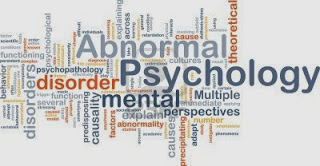Classification and Assessment of Abnormal Behavior
This is not the the full Classification and Assessment of Abnormal Behavior, but it is a basic outline of Abnormal Behavior's with sample traits.Example: My stomach frequently bothers me. At times, my body seems to ache all over.
Traits: Many physical complaints, cynical defeatist attitudes, often perceived as whiny, demanding.
2.) Depression: Depression may be described as feeling sad, blue, unhappy, miserable, or down in the dumps. Most of us feel this way at one time or another for short periods.
Example: Nothing seems to interest me anymore. My sleep is often disturbed by worrisome thoughts.
Traits: Depressed mood; pessimistic, worrisome, despondent, lethargic
3.) Hysteria: A mental disorder characterized by emotional excitability and sometimes by amnesia or a physical deficit, such as paralysis, or a sensory deficit, without an organic cause.
Example: I sometimes become flushed for no apparent reason. I tend to take people at their word when they’re trying to be nice to me.
Traits: Naive, egocentric, little insight into problems, immature; develops physical complaints in response to stress
4.) Psychopathic deviate: Psychopathic deviation is characterized by the following symptoms: asocial or amoral tendencies, lack of life satisfaction, family problems, delinquency, sexual problems, as well as discomfort in social situations.
Example: My parents often disliked my friends. My behavior sometimes got me into trouble at school.
Traits: Difficulties incorporating values of society, rebellious, impulsive, antisocial tendencies; strained family relationships; poor work and school history
5.) Masculinity-Femininity: gender identity disorder.
Example: I like reading about electronics. (M) I would like to work in the theater. (F)
Traits: Males endorsing feminine attributes: have cultural and artistic interests, effeminate, sensitive, passive; Females endorsing male interests: Aggressive, masculine, self-confident, active, assertive, vigorous
6.) Paranoia: a mental condition characterized by delusions of persecution, unwarranted jealousy, or exaggerated self-importance, typically elaborated into an organized system. It may be an aspect of chronic personality disorder, of drug abuse, or of a serious condition such as schizophrenia in which the person loses touch with reality.
Example: I would have been more successful in life but people didn’t give me a fair break. It’s not safe to trust anyone these days.
Traits: Suspicious, guarded, blames others, resentful, aloof, may have paranoid delusions
7.) Schizophrenia: a long-term mental disorder of a type involving a breakdown in the relation between thought, emotion, and behavior, leading to faulty perception, inappropriate actions and feelings, withdrawal from reality and personal relationships into fantasy and delusion, and a sense of mental fragmentation.
Example: Things seem unreal to me at times. I sometimes hear things that other people can’t hear.
Traits: Confused and illogical thinking, feels alienated and misunderstood, socially isolated or withdrawn, may have blatant psychotic symptoms such as hallucinations or delusional beliefs, or may lead detached, schizoid lifestyle
8.) Hypomania: a mild form of mania, marked by elation and hyperactivity.
Example: I sometimes take on more tasks than I can possibly get done. People have noticed that my speech is sometimes pressured or rushed.
Traits: Energetic, possibly manic, impulsive, optimistic, sociable, active, flighty, irritable, may have overly inflated or grandiose self-image or unrealistic plans
9.) Social Introversion: an introvert is a person who is energized by being alone and whose energy is drained by being around other people.
Example: I don’t like loud parties. I was not very active in school activities.
Traits: Shy, inhibited, withdrawn, introverted, lacks self confidence, reserved, anxious in social situations



